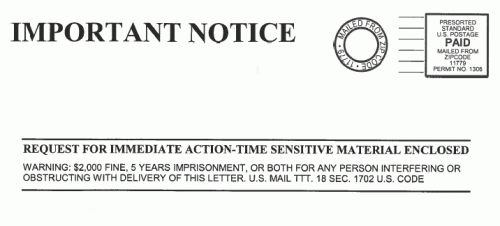I have debated a while whether to run this personal experience, and in the end have reached a (perhaps wimpy) compromise with myself to run it but disguise the agency involved.
As most of your know, I run a company that helps keep public parks open by privately operating them. As part of that business, it is unsurprising that I would run a specialized blog on such public-private recreation partnerships. Most of the blog is dedicated not to selling my company per se, since there are not many who do what we do, but advancing the concept. In particular, I spend a lot of time responding to objections from folks who are concerned that private operators will not serve the public well or care for public lands as well as civil servants do.
One such objection is around law enforcement -- parks agencies who oppose this model argue that my company cannot possibly replace them because all their rangers are law enforcement officials and mine, a certification my private employees can't match. So a while back I wrote an article discussing this issue.
I argued that parks were not some lawless Road Warrior-style criminal anarchy and simply did not need the level of law enforcement concentration they have. We run nearly 175 public parks and do so just fine relying on support from the sheriff's office, as does every other recreation business.
I argued that so many rangers were law enforcement officials because they have a financial incentive to get such certification (e.g. more pay and much better pension, plus the psychic benefits of carrying a gun and a badge) and not because of any particular demand for such services.
Finally, and perhaps most importantly, I argued that providing customer service with law enforcement officials can cause problems -- after all, McDonald's does not issue citations to their customers for parking incorrectly. To back up the last point, I linked to an article in the Frisky (of all places) and a Yelp review of a park where customers bombarded the site with one star reviews complaining about the rangers harassing them with citations and ruining their visit.
Well, one day I got a letter via email from a regional manager of the state parks agency whose park was the subject of that Yelp review I linked. I was notified that I had 48 hours to remove that blog post or I would lose all my contracts with that state. In particular, they did not like a) the fact that I linked to a negative Yelp review of one of their parks and b) that I impugned the incredibly noble idea that state parks are all operated by law enforcement officials. I found out only later that there is a very extreme law enforcement culture in this agency -- that in fact you historically could not even be promoted to higher management positions without the law enforcement badge, truly making this an agency of police officers who happen to run parks. I would normally quote the letter's text here, but it is impossible to do so and keep the agency's name confidential.
Fortunately, I was able to write the acting General Counsel of the agency that afternoon. Rather than sending something fiery as the first salvo, I sent a coy letter observing innocently that her agency seemed to believe that my contracts with the state imposed a prior restraint on my speech and I asked her to clarify the boundaries of that prior restraint so I would know what speech I was to be allowed. To her credit, she called me back about 6 minutes after having received the letter and told me that it was void and asking me to please, please pretend I had never received it. So I did, and I reward her personally for her quick and intelligent response by not naming her agency in the story.
I am reminded of all this and write it in response to this story passed on by Ken at Popehat. It is a story of free speech and petty government retribution for it. I will let you read the article to get the details, but I will repost the original speech that earned Rick Horowitz a good dollop of government harassment. As an aside, I realize in posting this how far from the law and order conservative I have come since my early twenties.
Your approach should be to try to live your life, as much as possible, without giving them one minute of your time. If they want to talk to you, you should ask, “Am I being detained, or arrested?” If they say “no,” then you walk away. If they tell you that you cannot leave, then you stay put, but don’t talk to them. Because they aren’t following the law when they detain you for no reason.
And if the government will not follow the law, there is no reason why anyone else should.
Let me repeat that:
If the government will not follow the law, there is no reason why anyone else should.
So this is the proposal I set forth:
To the government, you can start following the law, or none of us will.
To everyone else, if the government will not follow the law, you should stop pretending law means anything.
It’s time to step away from the wrong.
Start fighting over everything!



